The new codes governing everyday life in China
Beijing - It’s a ritual that has become hard to avoid in China - scanning a code with your mobile phone and proving your health credentials via an app, giving you the green light to go. Or not.
Entering residential buildings, businesses or a park, taking a plane, train or taxi, or simply trying to get home, you are well advised to make sure your phone battery is charged. In the wake of the coronavirus, tracking apps have never been so intrusive in China.
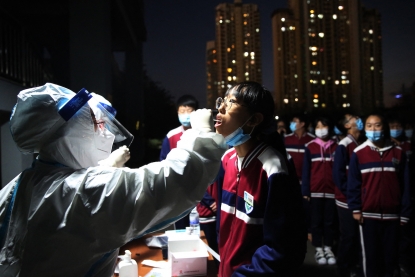 China has deployed health workers for mass Covid testing (AFP / Str)
China has deployed health workers for mass Covid testing (AFP / Str)You can now count on one hand the number of official daily new cases of the virus. But the number of times your health codes are checked has never been so high. I've given up counting how many times a day I have to go through it.
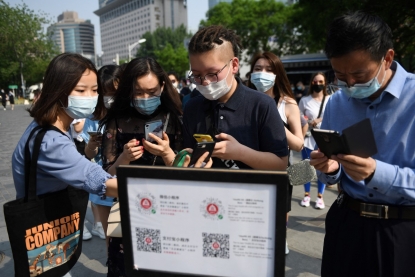 Shoppers must scan a health code on their smartphones to enter shopping malls (AFP / Greg Baker)
Shoppers must scan a health code on their smartphones to enter shopping malls (AFP / Greg Baker)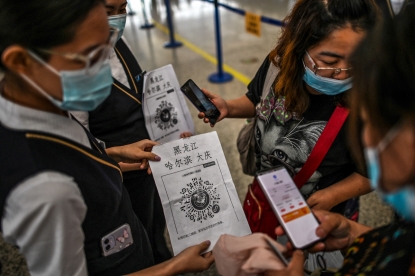 Passengers at airports must scan their health codes at the counter (Hector RETAMAL / AFP) (AFP / Hector Retamal)
Passengers at airports must scan their health codes at the counter (Hector RETAMAL / AFP) (AFP / Hector Retamal)
For the central government, it provides a wealth of data on people’s movements. Different tracking systems are available; one runs on the popular social media platform WeChat, China’s version of WhatsApp.
The app generates a QR health code which I have to show to gain access to certain places. If it produces a green code, I am allowed to go in. But if the code is red, I have to turn around and go into quarantine for 14 days.
The app determines my health status based on the places I have been. If I have been near a cluster of Covid cases, I may be designated a suspect case. It includes my record of Covid tests. If the last test result was positive, my QR code will be red.
Just yesterday, I received the first dose of my Covid vaccination -- now duly noted on my app for the next time I am stopped and checked.
But the app doesn’t just log my infection record. It is linked to my identity number. Every time I scan it, it keeps a digital record of where I am at that moment. In China every residential building is under surveillance and the people in it potentially subject to health checks: they may have to have their temperature taken or fill in a form. So every outing I make, however trivial, is recorded.
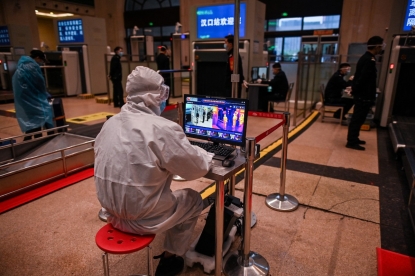 Temperature checks are imposed for travellers at Chinese airports (AFP / Hector Retamal)
Temperature checks are imposed for travellers at Chinese airports (AFP / Hector Retamal)No one openly obliges me to use the tracing app. But in practice, it is impossible to live without it. I tested this out one day, at a checkpoint at the entrance to the building that houses the AFP office in Beijing.
Somewhat disingenuously, I took out my old Nokia mobile telephone - a relic from the pre-smartphone era. Attempting to help me, a security guard found out that it was indeed impossible to scan a QR code using a phone without a camera. For five long minutes, he and his colleagues wondered what to do about this foreigner with his outdated telephone. Letting me in without scanning posed a health risk and could get them in trouble.
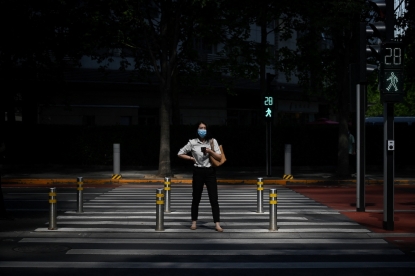
“What would an elderly person do, who didn’t have a smartphone?” I wondered, trying to keep a straight face in front of the guards. Amid the confusion, I slipped into the building. Five minutes later, our office received a call ordering me to provide a valid security code.
I don’t know if anyone learned a lesson from this incident. I have noticed that at Beijing’s international airport there is a sign advising anyone who does not have a mobile phone or health code to contact a member of staff. “You won't be able to pull that trick anymore,” laughed a Chinese friend of mine.
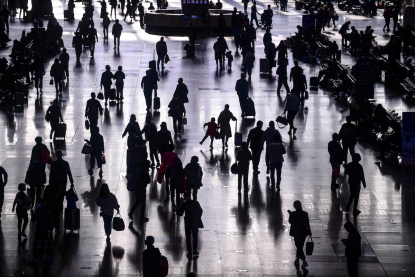 The rise in surveillance in the Covid crisis has gone largely unchallenged (AFP / Str)
The rise in surveillance in the Covid crisis has gone largely unchallenged (AFP / Str)The few adults who do not have mobile phones - as well as children - are given a health code to hang around their neck. It contains their identity and address so that the authorities can check whether they come from an area considered to be at risk.
In one of the most wired countries in the world, where there is little debate about issues of privacy and data protection, giant tech companies and telephone operators have no difficulty tracking Chinese people wherever they go.
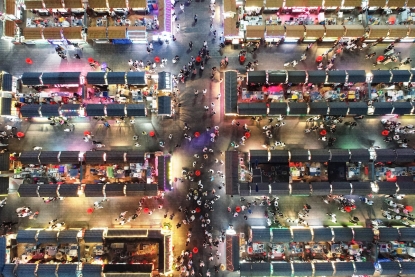 Public spaces like this night market in Shenyang came back to life after last year's lockdown (AFP / STR)
Public spaces like this night market in Shenyang came back to life after last year's lockdown (AFP / STR)The system has enabled journeys from one end of the country to another to resume. But going on holiday has turned into an obstacle course.
A passenger taking a domestic flight must present a series of different codes: one at check-in, sometimes a second one mid-transit, and a third on arrival. At each stage the passenger must fill in a digital form on their telephone. But so far in many cases the system is not designed for foreign passport-holders.
And if you are in a hurry, you don’t want to come up against the more diligent checkpoint guards.
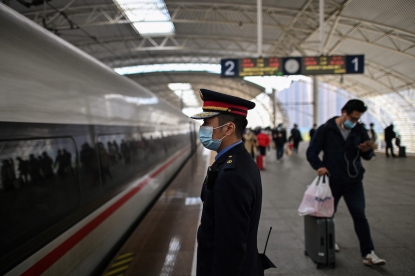 (AFP / Hector Retamal)
(AFP / Hector Retamal)Travelling is a step into the unknown. Journeys are also complicated by various local health regulations. Some hotels refuse to take travellers who cannot provide a negative Covid test certificate. This rule is not uniformly imposed and can depend on the hotel staff.
Last summer I was categorised as a possible contact case after a cluster was detected in Bejing, despite the fact I was 1,800 kilometres away in the southwest. The hotel where I was staying told me I had to go into isolation for two weeks. To avoid being forced into quarantine, I fled back to Beijing, abandoning my holiday plans.
To avoid similar disappointments, many people avoided travelling for the Lunar New Year holidays in February.
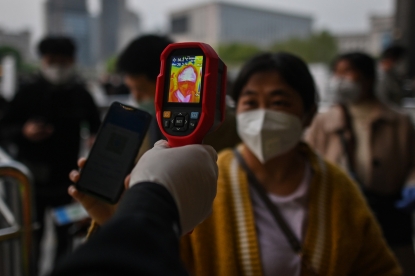 Citizens regularly have their digital health codes and temperatures checked (AFP / Hector Retamal)
Citizens regularly have their digital health codes and temperatures checked (AFP / Hector Retamal)To leave Beijing, travellers had to show evidence of a negative PCR test. Two tests were required to re-enter the capital, with the added risk of a two-week self-isolation period being imposed.
Travelling in China has become an administrative headache and surveillance seems to have increased. With one click on my health code, the authorities can know precisely where I have been over the past two weeks.
I grumble inwardly against the health checks that impinge on my freedom. At the same time, I have the feeling that my slightest movements are being spied upon.
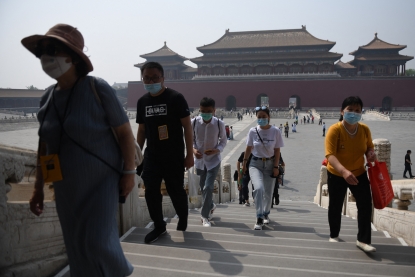 The rhythm of life in China has returned almost to normal (AFP / Greg Baker)
The rhythm of life in China has returned almost to normal (AFP / Greg Baker)Most Chinese people willingly consent to the tracing, however. During the Lunar New Year holiday, I was surprised to see all the shoppers scanning their codes to enter a mall in Beijing, even though there were no guards obliging them to do so.
Tracing apps “are the price you pay for getting your freedom back” after the virus restrictions and resuming normal life, said one of my Chinese friends. “It is a simple action to protect yourself.”
In terms of the pandemic, the system has undeniably worked. Every time someone tests positive for the virus, their contacts can be identified; their building and even their neighbourhood is placed in isolation if necessary.
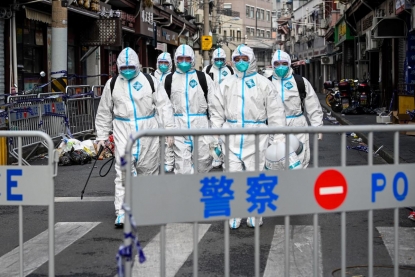 Neighbourhoods are locked down and disinfected when Covid is detected (AFP / Str)
Neighbourhoods are locked down and disinfected when Covid is detected (AFP / Str)In late 2019, China was in the front line of the coronavirus epidemic. Today it is one of the rare countries where the rhythm of life has returned almost to the way it was before the outbreak. That is largely attributed to widespread mask-wearing and to mass-testing.
But the tracing apps introduced to fight the disease, coupled with a pervasive network of security cameras, have provided the authorities with a formidable tool of mass surveillance. Last spring, media reported the case of a man wanted by the police who, after 24 hours on the run, turned himself in: he found it impossible to move around, enter shops or seek work without a smartphone and tracing app.
The apps can also be used to discriminate. In Wuhan, a city that was once the epicentre of the outbreak but now labelled the “safest town in the world” by its inhabitants, I was turned away from a nightclub - not because of my age or clothing, but my health code, which showed I had come from Beijing, 1,000 kilometres away, where a Covid cluster had just been detected.
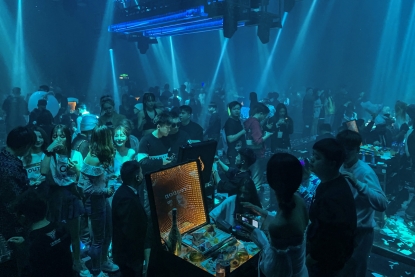 Nightclubs have reopened - but data on the Covid tracking app can get you barred (AFP / Hector Retamal)
Nightclubs have reopened - but data on the Covid tracking app can get you barred (AFP / Hector Retamal)Text: Sébastien Ricci. Translation: Kate Millar, Roland Lloyd Parry


